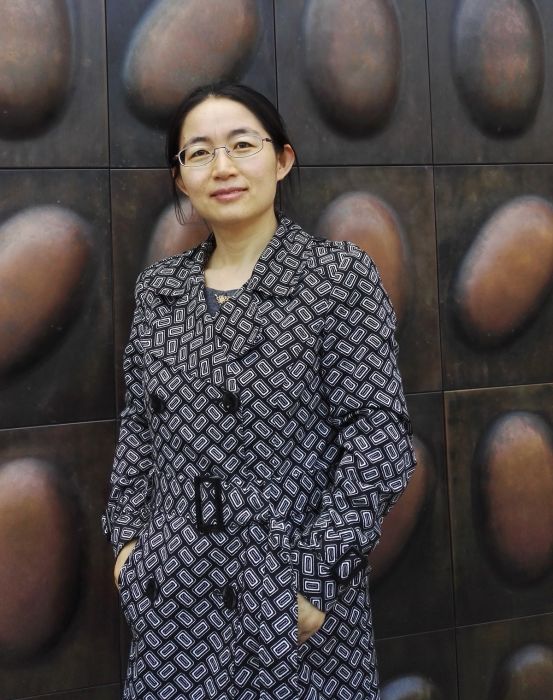基本介紹
簡介,研究領域,承擔項目,論文與著作,
簡介
2005年7月畢業於中國科學院心理研究所,期間跟隨羅躍嘉教授學習,獲理學博士學位。
2005年10月-2012年8月在美國密西根大學進行博士後研究。
2012年9月至今,在中國人民大學心理學系工作。
中國心理學會腦電相關技術專委會,委員
中國心理學會民族心理學專委會委員
中國認知科學學會社會認知科學分會,理事
中國管理科學與工程學會神經管理與神經工程研究會,理事
擔任Human Brain Mapping, Journal of Psychophysiology, Cognitive Science, Brain Research, 心理學報, 心理科學進展,心理科學等學術期刊審稿人。
開設課程:
本科生課程:情緒心理學;
研究生課程:情緒與動機,認知發展。
研究領域
綜合運用多種腦成像技術(ERP, EEG, fMRI, fNRIS等)研究兒童與成人高級認知功能的腦機制及其和情緒之間的相互影響。具體包括:動機和情緒對決策的影響,欺騙行為的腦機制,頓悟的神經機制,以及執行功能發展;同時也關注精神疾病如焦慮症(anxiety disorder)、自閉症(autism)對成人與兒童認知情緒功能的影響及其神經機制。
承擔項目
1. 北京師範大學認知神經科學與學習國家重點實驗室開放課題(項目負責人):Neural correlates of emotion regulation in preschoolers (CNLYB1212),2013.1-2014.12
2. 中央高校專項基金中國人民大學明德學者研究計畫(項目負責人):多人互動模式下兒童結果評價的腦機制(13XNLJ02)2013.4-2015.12
3. 國家社科基金重大項目(主要參與人):中國人社會認知的特徵:心理與腦科學的整合研究(12&ZD228),2013.1-2017.12
論文與著作
- Wu, H., Mai, X.CA, Tang, H., Ge, Y., Luo, Y., Liu, C CA. (2013). Dissociable somatotopic representations of Chinese action verbs in the motor and premotor cortex. Scientific Reports, 3: 2049, doi:10.1038/srep0204 2. Gu, Y., Mai, X., Luo, Y. (2013). Do Bodily Expressions Compete with Facial Expressions? Time Course of Integration of Emotional Signals from the Face and the Body. PLoS ONE 8(7): e66762. doi:10.1371/journal.pone.0066762 3. Chonchaiya, W., Tardif,T., Mai, X., Xu, L., Li, M., Kaciroti, N., Kileny,P., Shao, J., Lozoff, B. (2013). Developmental trends in auditory processing can provide early predictions of language acquisition in young infants. Developmental Science, 16(2): 159-172. 4. Li, M., Zhu, Li., Mai, X., Shao, J., Lozoff, B., Zhao, Z. (2013). Sex and gestational age effects on auditory brainstem responses in preterm and term infants. Early human development, 89(1): 43-48. 5. Mai, X., Xu, L., Li, M., Shao, J., Zhang, Z., deRegnier, R., Nelson, C. A., & Lozoff, B. (2012). Auditory recognition memory in 2-month-old infants as assessed by event-related potentials. Developmental Neuropsychology, 37(5): 400-14. 6. Feng,C., Wang, L., Liu, C., Zhu, X., Dai, R., Mai, X. CA, Luo, Y CA. (2012). The Time Course of the Influence of Valence and Arousal on the Implicit Processing of Affective Pictures. PLoS ONE, 7(1): e29668. 7. Chen, C., Liu, C., Huang, R., Cheng, D., Wu, H., Xu, P., Mai, X., Luo, Y. (2012). Suppression of aversive memories associates with changes in early and late stages of neurocognitive processing. Neuropsychologia, 50(12):2839-2848. 8. Liu, C., Tang, H., Luo, Y., Mai, X CA. (2011). Multi-representation of symbolic and nonsymbolic numerical magnitude in Chinese number processing. PLoS ONE, 6(4): e19373. 9. Mai, X., Tardif, T., Doan, S. N., Liu, C., Gehring, W.J., Luo, Y. (2011) Brain activity elicited by positive and negative feedback in preschool-aged children. PLoS ONE, 6(4), e18774. 10. Sun, S., Mai, X., Liu, C., Liu, J, & Luo, Y. (2011). The processes underlying deception: ERP spatiotemporal principal component analysis and source analysis. Social Neuroscience. 6(4):348-59. 11. Mai, X., Ge, Y., Tao, L., Tang, H.H., Liu, C., Luo, Y. (2011). Eyes are windows to the Chinese soul: Evidence from the detection of real and fake smiles. PLoS ONE, 6(5): e19903. 12. Wu, J., Yu, Z., Mai, X., Wei, J., & Luo, Y. (2011). Pitch and loudness information encoded in auditory imagery as revealed by event-related potentials. Psychophysiology, 48, 415-419. 13. Wu, J., Mai, X., Yu, Z., Qin, S., & Luo, Y. (2010). Effects of discrepancy between imagined and perceived sounds on the N2 component of the event-related potential. Psychophysiology, 47, 289-298. 14. Liu, C., Ge, Y., Mai, X., Luo, Y. (2010). Exploring the conceptual and semantic structure of human kinship: An experimental investigation of Chinese kin terms. Behavioral and Brain Sciences, 33, 392-394. 15. Liu, C., Tardif, T., Mai, X., Simms, N., Gehring, W. J., & Luo, Y. (2010). What’s in a name? Brain activity reveals categorization processes differ across languages. Human Brain Mapping. 31(11):1786-1801. 16. Monk, C.S., Telzer, E.H., Mogg, K., Bradley, B.P., Mai X., Louro, H.M.C., Chen, G., McClure-Tone, E.B., Ernst, M., & Pine, D.S. (2008). Amygdala and ventrolateral prefrontal cortex activation to masked angry faces in children and adolescents with generalized anxiety disorder. Archives of General Psychiatry, 65, 568-576. 17. Liu, C., Zhang, W., Tang, Y., Mai, X., Chen, H., Tardif, T., & Luo, Y. (2008). The visual word form area: evidence from an fMRI study of implicit processing of Chinese characters. NeuroImage, 40, 1350-1361. 18. Telzer, E.H., Mogg, K., Bradley, B.P., Mai X., Ernst, M., Pine, D.S., & Monk, C.S. (2008). Relationship between trait anxiety, prefrontal cortex, and attention bias to angry faces in children and adolescents. Biological Psychology, 79, 216-22. 19. Wu, J., Mai, X., Chen, C., Zheng, Y., & Luo, Y. (2006). Event-related potentials during mental imagery of animal sounds. Psychophysiology, 43, 592-597. 20. Mai, X., Luo, J., Wu, J., & Luo, Y. (2004). “Aha!” effects in a guessing riddle task: An ERP study. Human Brain Mapping, 22, 261-270. (cover paper) 21. 買曉琴, 羅躍嘉. 自然物體分類的ERP研究. 心理科學進展, 2004, 12 (2): 168-175 22. 劉超, 買曉琴, 傅小蘭. 不同注意條件下的空間-數字反應編碼聯合效應. 心理學報, 2004, 36(6): 671-680 23. 劉超, 買曉琴, 傅小蘭. 內源性注意與外源性注意對數字加工的不同影響. 心理學報, 2005, 37(2): 167-177 24. 買曉琴, 羅躍嘉. 事件相關電位P300在痴呆診療中的套用. 中國臨床康復, 2002, 6 (23): 3520-3521 25. 買曉琴, 羅躍嘉. 美國的物理治療專業(PT)學位培養計畫. 中國康復理論與實踐, 2001, 7 (1): 31-32 26. 羅躍嘉,買曉琴. 美國國家心理健康研究所介紹. 心理學動態, 2001, 9 (1): 88-9427.買曉琴,羅勁,吳建輝,羅躍嘉猜謎作業中頓悟的ERP效應.心理學報,2005,37(1):19-25
- 1. Luo, Y., Sun, S., Mai, X., Gu, R., & Zhang, H. (2011). Outcome Evaluation in Decision Making: ERP Studies. In S. Han & E. Popper (Eds.), Culture and Neural Frames of Cognition and Communication (pp. 249-285). On Thinking 3, Springer-Verlag Berlin Heidelberg.2. 羅躍嘉, 高原, 買曉琴. (2006). 腦磁圖. 趙志奇、陳軍(主編). 現代神經科學研究技術 (pp. 925-952). 北京:科學出版社. 3. 羅躍嘉,買曉琴. (2002). 視覺加工的兩條通道. 魏景漢,羅躍嘉(主編). 認知事件相關腦電位教程 (pp. 46-54). 北京:經濟日報出版社 4. 羅躍嘉,南雲,買曉琴. (2002). 關於人類認知ERP研究的指導手冊. 魏景漢,羅躍嘉(主編). 認知事件相關腦電位教程 (pp. 318-336). 北京:經濟日報出版社1, 9 (1): 88-94

